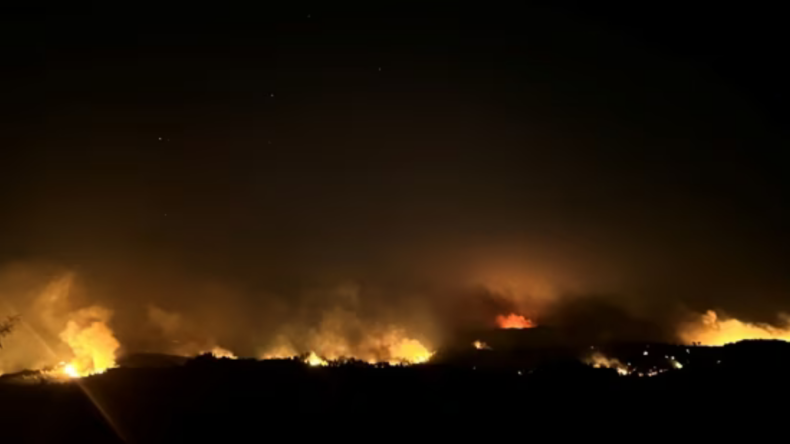Devastating wildfires ravage the picturesque Greek island of Rhodes, plunging it into a state of emergency. Climate change exacerbates the crisis, posing significant challenges for both the island’s tourism industry and emergency responders.
RHODES, Greece – A catastrophic wildfire outbreak has engulfed the idyllic Greek island of Rhodes, transforming it from a paradise destination to a nightmarish inferno. Thousands of residents and tourists are fleeing for their lives, seeking refuge on beaches and in makeshift shelters as the relentless flames threaten resorts and coastal villages. As the fires rage on for the sixth consecutive day, evacuation efforts have become the largest in Greece’s history, with authorities grappling to transport affected individuals to safety by both land and sea.

Flames Sweep Through Popular Tourist Destination
The once-vibrant holiday hotspot of Rhodes has become the epicenter of devastation, with wildfires consuming vast stretches of forests and encroaching upon bustling resorts and picturesque coastal settlements. The situation has resulted in thousands of people frantically seeking escape from the flames that have engulfed the southeastern coast of the island.
As the fires intensified, a massive evacuation operation swung into action. Residents and tourists found themselves evacuating on foot, trudging for miles through scorching heat to reach safe areas. Many others sought refuge on beaches and streets, hoping to find a temporary sanctuary amidst the chaos. Boats, both private and coastguard vessels, played a crucial role in rescuing over 3,000 stranded tourists from beaches, offering a glimmer of hope amidst the unfolding disaster.
Rhodes, renowned for its sandy beaches and historic sites, attracts throngs of tourists, particularly from Britain, Germany, and France, during the peak season. However, the wildfires have brought tourism to a standstill, with major operators like Jet2 and TUI forced to cancel all flights to Rhodes. The island’s hospitality sector, including hotels and restaurants, faces severe repercussions, leaving thousands of tourists stranded and grappling with uncertainty.
Greek authorities attribute the increasing frequency and intensity of wildfires to the impacts of climate change. Extreme heat waves, exacerbated by global warming, have become more common across southern Europe, including Greece. With temperatures soaring above 40 degrees Celsius, the conditions have been ripe for the rapid spread of these devastating fires.
Acts of Courage and Generosity
Despite the calamity, stories of resilience and humanity emerge amidst the chaos. Local residents have exhibited remarkable generosity, providing food, water, and assistance to evacuees. British tourists recounted the kindness of locals, who refused payment for essential supplies and ensured the safe evacuation of women and children first. Such acts of solidarity and compassion offer a glimmer of hope amidst the tragedy.
International Aid and Collaboration
Facing a formidable challenge, Greek firefighters, supported by 18 aircraft, have been working tirelessly to contain the flames and protect the remaining unscathed areas of the island. The international community has also lent a helping hand, with countries like Croatia, France, Slovakia, and Turkey offering aid in the firefighting efforts.
As Rhodes grapples with the aftermath of the catastrophic wildfires, the full extent of the damage remains uncertain. The island’s residents and the hospitality industry are left to pick up the pieces in the wake of this unprecedented disaster. Amidst the devastation, the spirit of solidarity and acts of kindness have offered a glimmer of hope, demonstrating the resilience of both the local community and the tourists who once sought tranquility and beauty on the shores of this now-fire-ravaged paradise. As the world continues to confront the realities of climate change, the catastrophe on Rhodes serves as a stark reminder of the urgent need for collective action to safeguard our planet and its cherished destinations.













